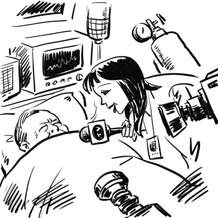 A student team at the University of London discovered that excellent health could be worth as much as a pay increase of 304,000 pounds ($600,077) a year. Although this finding on the value of happiness is a bit daunting to most Chinese, health has become one of the top concerns in the country, along with housing and children's education. A student team at the University of London discovered that excellent health could be worth as much as a pay increase of 304,000 pounds ($600,077) a year. Although this finding on the value of happiness is a bit daunting to most Chinese, health has become one of the top concerns in the country, along with housing and children's education.
Catering to popular demand, local and national television networks have increased the number of programs on health and medical advice. Even some talk shows, which share personal stories, have invited guest speakers to reveal their feelings about their lives plagued with illnesses ranging from cancer to mental troubles. While these programs have helped boost ratings, I fear some are too indulgent in their sensationalism. The producers as well as the hosts have violated media ethics and personal privacy. As an honored guest, a middle-aged woman appeared on a local TV talk show to narrate the hardship she, her elder sister and mother have suffered over the past 13 years, ever since her sister gave birth to a son. since her sister gave birth to a son. The boy was nick-named "Wolf Boy" even though there was no way he was going to grow up in the jungle. He began to display extreme violence when he was only 4 years old. Heart-broken, his father left, and the rest of the family on the maternal side have sustained repeated beatings. For a brief moment, the boy and his grandmother also appeared in the TV studio. After they left, the hostess took out a microphone and told the audience that she hadn't previously used it for fear that the boy would use the microphone as a weapon against his auntie or grandma. I felt the program was unethical in bringing the boy onto the show while dismissing him as violent and harmful. The show is not an exception. Viewers have witnessed a man with complex mental problems talk about his illusions and a woman with breast cancer vow her resistance to surgery because she wants to keep her body complete for her husband, even in death. Except for arousing tears, fantasy and emotion, we don't see any point the shows were making. The producers may argue that they leave judgment to the audience. But I believe TV networks are duty-bound not to send wrong messages to people in need of sound medical advice. Only after some digging, did I discover that the case of "Wolf Boy" exposes how inadequate medical knowledge at the local level delayed the boy's treatment. In fact, medical experts now say that parents should seek expert advice and treatment when their children display handicaps in speech or mental problems well before they are 3 years old. In March, a leading neurosurgeon finally performed surgery to try to correct the boy's behavior. As to the case of the woman with breast cancer, the program should not let her give a one-sided narrative. Instead, it should rally the voices of women who have the courage to live a far-fuller life after undergoing surgery or other treatment for breast cancer. The program should seek out the advice of medical professionals who have ample data to show that treatment for early-stage breast cancer leads to a highly promising rate of survival. Yes - the Internet and other forms of instant communication have blurred the line between information and exploitation, but television shows hungry for ratings still owe their viewers balanced information. E-mail: lixing@chinadaily.com.cn (China Daily 06/14/2007 page10)
|

